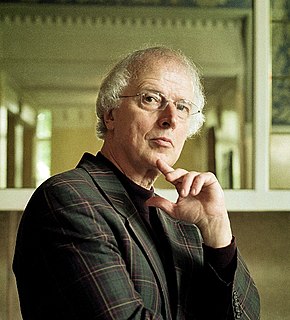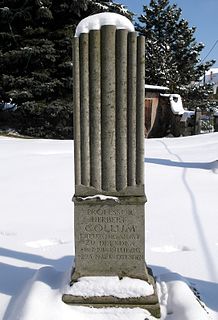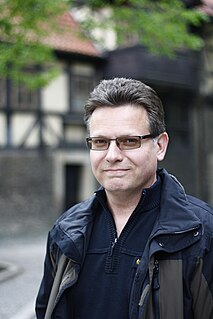Related Research Articles

Hugo Distler was a German organist, choral conductor, teacher and composer.

Udo Zimmermann is a German composer, musicologist, opera director and conductor. He worked as a professor of composition, founded a centre for contemporary music in Dresden, and was director of the Leipzig Opera and the Deutsche Oper Berlin. He directed a contemporary music series for the Bayerischer Rundfunk and a European centre of the arts in Hellerau. His operas, especially Weiße Rose, on a topic he set to music twice, have been performed internationally and recorded.
Duo Gelland is a Swedish-German violin duo on the international classical scene. The members are Cecilia and Martin Gelland. The duo was founded in 1994.
Andreas Karasiak is a German classical tenor in opera and concert.

Hans-Christoph Rademann is a German choral conductor, currently the director of the Dresdner Kammerchor and the Internationale Bachakademie Stuttgart.
The Dresdner Kammerchor is a mixed chamber choir which was founded in 1985 by Hans-Christoph Rademann in Dresden and is still conducted by him. The semiprofessional ensemble of about 40 singers has appeared internationally.

Geistliche Chormusik is a collection of motets on German texts for choir by Heinrich Schütz. It was printed in Dresden in 1648 as his Opus Undecimum, and comprises 29 individual settings for five to seven voices, which were assigned numbers 369 to 397 in the Schütz-Werke-Verzeichnis (SWV). The original title was Geistliche Chor-Music, Erster Theil which indicates that Schütz planned a second part. It is also known as Geistliche Chor-Music 1648. The collection contains earlier and new works and a German arrangement of a motet by Andrea Gabrieli.
Lioba Braun is a German opera singer and academic teacher at the Hochschule für Musik und Tanz Köln and the Hochschule für Musik und Theater München. Based at the Nationaltheater Mannheim, she has appeared mostly in mezzo-soprano parts at major opera houses and festivals. She became internationally known appearing as Brangäne at the Bayreuth Festival in 1994, and performed the soprano part of Isolde on stage first in 2012.

Johannes Hill is a German baritone in concert and in oratorios, who has performed internationally. Singing in choirs from age 10, he has performed major roles in oratorios, such as both Jesus and Pilate in Bach's Passions, and Pope Francis in the premiere of Laudato si'. He has also performed in vocal ensembles such as Kammerchor Stuttgart and Collegium Vocale Gent.
Gertraud Geißler is a German pianist and university lecturer for piano playing and co-repetition at the Hochschule für Musik Carl Maria von Weber Dresden. In 1978 she won the Robert Schumann Prize of the City of Zwickau.
Wilfried Krätzschmar is a German composer.
Karl-Rudi Griesbach was a German composer, librettist, dramaturge, music critic and academic teacher.

Friedrich Schenker was a German avant-garde composer and trombone player.

Herbert Collum was a German organist, harpsichordist, composer and conductor.

Bernhard Schneyer is a German composer, conductor and music educator.
Thomas Christoph Heyde is a German composer, media artist and curator. He is chairman of the Forum Zeitgenössischer Musik Leipzig.
Günter Neubert is a German composer and tonmeister.
Horst Förster was a German conductor, choirmaster, violinist and university teacher. In 1952, he was appointed the youngest General Music Director of the GDR in the Landestheater Eisenach. Afterwards, he was chief conductor of the Philharmonisches Staatsorchester Halle and the Singakademie Halle (1956–1964) as well as the Dresden Philharmonic (1964–1966).
Helmut Branny is a German conductor, double bassist and professor of chamber music at the Hochschule für Musik Carl Maria von Weber Dresden. He is a member of the Sächsische Staatskapelle Dresden, musical director of the Dresdner Kapellsolisten and the Cappella Musica Dresden. With the Kapellsolisten, he has made many recordings, and toured internationally.
The Sinfonietta Dresden is a chamber orchestra from Dresden founded in 1994.
References
- ↑ "Keuk, Alexander". Datenbank Neue Musik.
- ↑ "KEUK, Alexander Komponistenlexikon – Deutscher Komponistenverband". www.komponistenlexikon.de.
- ↑ "Alexander Keuk, Autor auf Musik in Dresden".
- ↑ Alexander Keuk | nmz – neue musikzeitung Contributions by Alexander Keuk for the Neue Musikzeitung
- ↑ "Jubiläumskonzert des Dresdner Kammerchores in der Dreikönigskirche". DNN – Dresdner Neueste Nachrichten .
- ↑ "Kulturstiftung des Freistaates Sachsen: Archiv 2010". www.kdfs.de. Archived from the original on 2020-06-08. Retrieved 2020-05-19.
- 1 2 Wiermann, Barbara. "musiconn.performance". musiconn.performance — Das Eingabe- und Recherchetool für die Musikwissenschaft.
- ↑ "Vineta-Exerzitien – Keuk, Alexander". Datenbank Neue Musik.
- ↑ "Uraufführungen – Dresdner Kammerchor". www.dresdner-kammerchor.de.